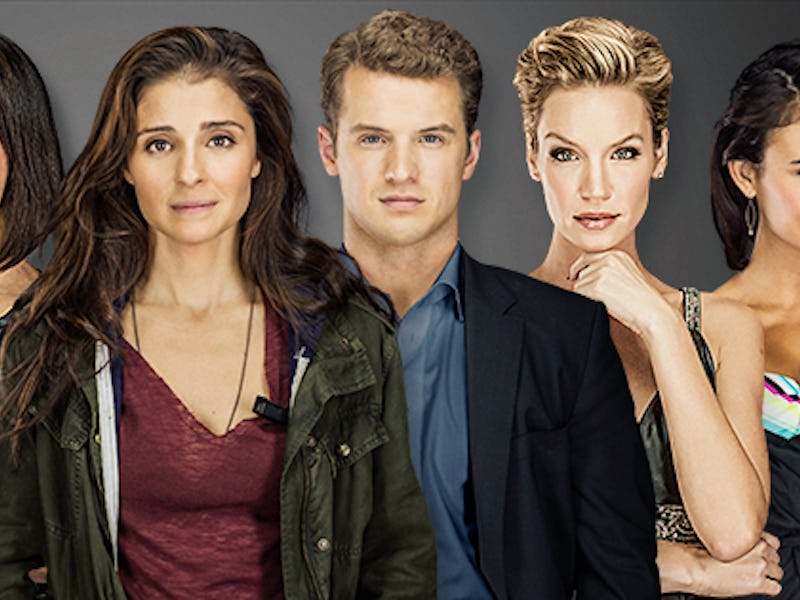How 'UnREAL' Became One of the Year's Best Shows
Lifetime's show-about-a-show is a dizzying, self-reflexive joyride. Are you watching?

Despite some critical acclaim and modest recap coverage in your favorite culture rags, it’s still possible you aren’t watching Lifetime’s original show UnREAL, a series that goes behind the cameras on a reality TV set. This is an oversight if you identify as a television connoisseur; eight episodes in, it’s distinguished itself as one of the year’s best seasons (especially since HBO’s recent programming has been so puzzling and inevitably disappointing). It has become popular enough to be renewed for a second season, so consider catching up – there’s little else like it.
What’s interesting about the media coverage of the show is the degree to which people struggle to characterize it. Many see it as emotionally draining and even tragic (the Times called it “unrelentingly sad”), while to others it is more primarily a pitch-black ensemble comedy. It fits much more neatly into the second category, though in truth its best moments throw that designation into question. The show vacillates between veritė and near-farcical drama with ease, much as a reality show does, creating – often – a seasick-inducing feeling, or a brain freeze as one attempts to peel away the levels of artifice. While playing games and making arrangements are the stuff of the show-within-a-show (Everlasting, which shares the basic premise of the Bachelor), far more complex deceptions and competitions take place behind the scenes. UnREAL’s cameras are as up in its characters’ faces – whether put-on or authentic – as the The Bachelorette’s (which runs the hour before UnREAL on ABC) are on theirs.
The levels-upon-levels invest us in the action no matter how strongly we push to resist. Part of this is the fault of the show’s lovingly and sharply drawn characters –chiefly, the two leads. The protagonist Rachel Goldberg (Shira Appleby, of Roswell fame) is Everlasting’s most successful and notorious producer, despite her potentially career-killing breakdown on-screen at the end of its previous season. Executive producer Quinn King (Constance Zimmer) has brought her back on for the following season (the franchise’s 13th), ignoring all advice, because of Rachel’s exceptional abilities. She is an expert at manipulating the show’s participants – at teasing good TV out of them.
But because Quinn is the only one crazy enough to provide her with a job, Rachel is essentially under her thrall. Rachel is forced to bend her moral compass and carry out reprehensible covert operations. In these maneuvers, she always runs the risk of ruining contestants’ lives; Rachel has to find the best way to steer clear of this and still give Quinn what she wants (ratings). There’s always extra cash behind it for Rachel, and she has both debts to pay and plenty of ambition.
Appleby carries off the demanding character expertly, vacillating and towing the line between being a “manipulative bitch,” and a depressed, guilt-ridden neurotic who yearns to escape her seedy line of work. Zimmer’s Quinn — who seems, initially, to be primarily just the devil to which Rachel has signed herself over — also proves to be an exceptionally complex and even sympathetic character. She’s a hard-as-nails, almost-middle-aged woman who has been undercut professionally and in her private life multiple times, and has developed a bag full of crafty and often ruthless tricks to get what she deserves. She remains in a palpable and often heartbreaking amour fou relationship with the show’s “creator,” Chet, alternately charismatic and despicable, throughout the show. In the same way Rachel plays her “girls” to boost ratings and carry them to the final round of the shows, Quinn plays Chet when he (not infrequently) betrays her or treats her like a plaything. The relationship, like the show, is full of movingly real and farcical ones; the push and pull is heady and compelling.
This gets at UnREAL’s most distinctive element: the way in which the show’s frame story assumes the tone and style of the show-within-a-show. The dominant atmosphere behind the scenes of Everlasting is tense and competitive, and the ambiguity between what is an act and what is the honest, painful truth is always in question. Sometimes we notice the characters even lying to themselves. In the most recent episode, for example, a tragic death halts production on Everlasting. This finds everyone at the end of their rope; blame for the death rests to some extent on all sides, and ultimately all the characters vie for their perspective on the event to become the accepted one. They enter survival mode, struggling to accept the extent to which they helps precipitate the disaster. With the reality show itself not in production, the crisis behind the scenes becomes its own veneered drama — much of this “real” action is filmed for a video which is being subtly engineered to redeem the show in the public eye, and to protect it from lawsuits. Only Rachel can figure out the best way, if not exactly the “right” one, to save the show, and its participants, finessing everyone around her into compliance.
The show has its weak points – for instance, Rachel’s erstwhile love interest, the cameraman-turned-DP Jeremy (Josh Kelly) gives an unconvincing performance, and Rachel’s family backstory feels overwrought and vestigial. However, UnREAL is truly refreshing as a whole; in its form and narrative conceit, it feels unprecedented. It comes in the guise of pulp (it doesn’t feel out of place on the Lifetime channel), but it is smart, expertly acted, brutally funny and, best of all, unpretentious. Like proper reality television, it is not afraid to walk the line between smart and trashy. At its best moments, the show makes viewers reconsider their perspective on that genre, while absorbing us into its own well-crafted, fastpaced narrative.